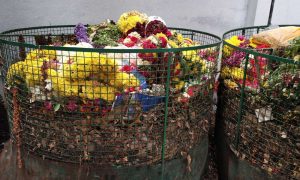The erstwhile Garden City has a problem with floral waste
By Riya Sharma
On the streets behind temples around Kasturba Nagar and Kalidasa Layout in Bangalore, heaps of floral waste create an eye sore and a stink.
The floral offerings considered sacrosanct are not disposed of with the other garbage but are dumped into landfills or water bodies, polluting the lakes. Stray dogs and cattle scavenging around the floral trash further befoul the area .
Murthi, a priest at a temple in Kasturba Nagar, said that a floral waste management program requires funds and extra space, which most small-scale temples do not have.
The Sri Shakthi Kalyan Mahaganpati temple in HRBR layout of Bangalore is one of the first zero-waste temples in the city to implement the floral waste management plant.
Mr. R. K. Mohanto, the temple manager, said, “Segregation and composting at the source reduces the waste generated by at least five to seven tonnes per year. This is our contribution towards solving the problem of landfills.”
The temple, Mr. Mohanto said, wishes to lead by example and as a responsibility to the environment has also employed other environmentally-friendly measures.
The city has other initiatives to deal with floral waste, too. Ms. Anupama Harish, a member of the Solid Waste Management Round Table – a public initiative, has helped set up floral waste management systems called ‘Shishira‘ in this and about 15 other temples in Bangalore. These Shishiras recycle the floral waste by composting stale flowers along with banana leaf bowls (donne) to produce organic manure.

Mr. Ashok Betraj, trustee of the Sri Shakthi Kalyan Mahaganpati temple, insisted that since temples work on public money, it is the trust’s responsibility to make the public mindful of the floral waste they generate by informing them that part of their money is spent on its composting.
However, people like Murthi insist that people are part of the problem. He said, “Devotees lack awareness about the seriousness of this issue.”
Vasuki Iyengar, a waste management consultant and founder of the social enterprise Soil and Health Solutions, said, “The floral waste chokes stormwater drains and canals”.
Even a simple garland, he explained, comes with some polystyrene and other flashy plastic decorations, which clog the canals and lead to a flood-like situation during rains.
“People spend a massive amount of money to purchase these beautiful flowers and the next day these add to the stinking dump near the temples, which the BBMP will not pick up since it is considered holy”, Mr.Betraj stated.
Floral waste can be effectively disposed of by making incense sticks out of it. However, 500 kilograms of segregated waste has to be transported to a centralized location for that, Mr. Vasuki stated. The Kanpur-based HelpUsGreen is one such organisation.
Mr. Betraj added that segregation requires an effective collection mechanism which can be very expensive. This is why a project of such a scale has not come up in Bangalore yet.
Organic products made from floral waste require a subsidy from the government to be sustainable and financially viable, said Mr. Vasuki, “If a package of incense sticks made from chemicals is available at Rs. 40, then a package made from floral waste would cost about Rs. 130-140. And who is going to bear the cost of the additional price?”
Chaitra, manager at Hasiru Dala, an organization that is trying to implement an initiative in Bangalore similar to the HelpUsGreen project, said, “We have tested the project on temples around Nandi Hills, but collecting 500 kilograms of unsegregated floral waste is difficult, expensive and requires more manpower. The temples aren’t that well equipped either.”
She said that the project is still in the pipeline but there is no deadline for its start.
Until these initiatives are implemented, no floral waste should go out of its respective ward, Mr. Vasuki said, “The intent should be to compost floral waste within the premises of each home, temple or community and reduce the burden on the landfills and water bodies, thereby preventing further environmental pollution.”





I’d never realised it was such a great problem
The heading says it all!
Author picked a unique and genuine problem. People may got motivation and awareness about this small but effectwise a big issue by this story.
A -must be highlighted- issue, I commend the Author for bringing this issue to public eyes. Essential oils can be extracted from these floral wastes and the rest and be used as organic compost. There’s a lady from Bangalore, Parimala Shivprasad, who proposed this idea. She’s a chemical engineer and am eco-entrepreneur, She even did research on this idea but sadly noone seemed interested in something that’ll actually save the environment and solve such problems.
It’s about time we start addressing serious problems like this one.
Kudos to the author.
Temples have access to rivers and lakes, they tend to dispose of them in flowing water because that is considered holy. And this adds heavily polluted waterways.
So one way we can do as suggested by a women in Bangalore named “Parimala Shivaprasad”(chemical engineer and eco-entrepreneur) is to collect essential oils from the fragrant part, the biomass, and then compost the rest of the biomass to produce organic manure.
Appreciate the efforts of writer how the problem is highlighted in detail. Uniquely picked up the problem which we neglect in our daily life and it aware the people about not only plastics but floral waste also affects the environment. I also like the message how we can help in managing the waste and can stop environmental pollution.
Really a great article. Article insists to think over the problem. Writer given the ideas to use the floral waste by making essential sticks and oil that can be again used for worship. In a prayer we used to say ” tera tujhko arpan”. The line can be practically implemented.
Well done..what a thought.we never think like this.
Its a motivational artical I will support this matter
Beautifully Written!!
Yes.its a big problem.we should take some positive step against this .we can use this foral waste to make colour and perfume.welldon by this article you point on big problem of the cities
Attaboy!!
This is a very well structured article. It is so refreshing to read a news item which does not contain any negativity. I really hope that more people read this article and become environmentally conscious. Flowers in temples are something which we may use everyday but we never think of them this way. A very thought-provoking subject that you investigated and expressed beautifully.
Lot of appriciation for writer. Good Work. Keep going.
The heading itself is enough….and beautifully framed.
Great job I will support this matter.
Yes .. it’s a great problem. In the days of yore, the flowers were immersed in the rivers as it was considered as an ancient tradition but nowadays many NGOs are working on it and organic colours and incense sticks are being made by recycling floral waste. Really an inspirational article riya to create awareness among people.
Organic matter from rotting flowers contributes to the growth of algae, which can deplete oxygen levels and cause marine life to die. Rotting flowers may also cause pollution problems on land.so its really a good idea to recycle flower waste to make incense sticks and all.
Its really an amazing and motivational article written by you riya…i really appreciate you.
Its really an amazing and motivational article written by you i really appreciate you.
Great job riya .nice story about the miss use of flowers.and the suggested solutions are really good.
This matter should concerned by the municipal corporation and bring some good initiatives regarding the same and should confirm and raise funds for this. I really thanks to the author who is bringing some main society problems at the front of society. I suggest her to tag government authorities in as well. All the best